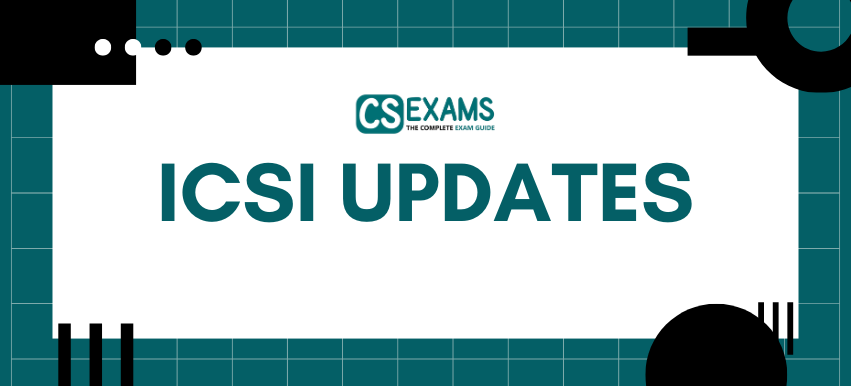ICSI has made the CS Executive Syllabus for the June 2026 exam available. The comprehensive syllabus guide includes registration deadlines, a summary of the subjects, and professional preparation advice.
The Institute of Company Secretaries of India (ICSI) manages the Executive Examinations of the Company Secretary (CS), which provides a step for candidates with a step for an attractive career in corporate governance and compliance.
Candidates need to register by 31 January 2026, on icsi.edu, to become eligible for the June 2026 attempt. This article summarizes the CS Executive Syllabus for the June 2026 exam, its exam pattern, and preparation strategies to assist you in acing it.
Overview CS Executive Syllabus 2026
The CS Executive program is in the middle level of the CS course. It consists of two modules, each of which is intended to give a solid grounding in corporate laws, securities, and other areas of the profession. The Institute of Company Secretaries of India (ICSI) has directed candidates registered under the CS Executive old syllabus (2012) to switch to the updated syllabus introduced in 2017.
| Particulars | Details |
| Mode of Exam | Center-based examination; Offline |
| Duration of Exam | Three hours for each paper |
| Marks | 100 marks for each paper |
| Language of Question Paper | English |
| Eligibility | The candidate should have passed the CSEET |
| Nature of questions | MCQs and Descriptive |
| Pre-Examination Requirement | Complete a Pre-Examination Test to become eligible to Enroll |
| First Examination Under New Syllabus 2022 | June 2023 |
| Last Attempt Under Old Syllabus 2017 | December 2024 |
| Marking Scheme | Each paper is worth 100 marks, with a minimum of 40% in each paper and an aggregate of 50% to pass a module |
Enroll Now for CS Executive Courses
CS Executive Syllabus 2026
ICSI has published the new CS Executive syllabus for June 2026 on its website. It informs you about what you'll learn, the key topics, and even the minor details for each exam paper. If you're preparing for the exam, you can see the 2026 syllabus details in the table below.
CS Executive Syllabus 2026 Module 1
The CS Executive Syllabus 2026, Module I, is a complete guideline that aims to provide students with a basic understanding of company secretaryship. It is divided into four papers: Jurisprudence, Interpretation & General Laws, Company Law, and Setting up of Business Entities.
| CS Executive Syllabus 2026 Module I | ||
| Old Syllabus | New Syllabus | Marks |
| Tax Laws & Practice | Tax Laws | 100 |
| Company Law | Jurisprudence, Interpretation & General Laws | 100 |
| Cost & Management Accounting | Company Law | 100 |
| Economic & Commercial Laws | Setting up of Business Entities and Closure | 100 |
CS Executive Syllabus Module 2
The CS Executive Syllabus June 2026 Module II is a crucial component of the Company Secretary course, focusing on advanced topics in company secretaryship. It comprises five papers, including corporate & management accounting and securities laws & capital markets.
| CS Executive Syllabus June 2026 Module II | ||
| Old Syllabus | New Syllabus | Marks |
| Company Accountants and Auditing Practices | Corporate & Management Accounting | 100 |
| Industrial, Labor and General Laws | Economic, Business and Commercial Laws | 100 |
| Financial and Strategic Management | Financial and Strategic Management | 100 |
| Capital Markets and Securities Laws | Securities Laws & Capital Markets | 100 |
ICSI CS Executive New Syllabus (2022)
The ICSI CS Executive New Syllabus is a new curriculum developed to impart superior knowledge and skills in company secretaryship. It prioritizes up-and-coming trends, best practices, and regulatory needs.
| ICSI CS Executive New Syllabus | |||
| Paper No. | Group 1 | Paper No. | Group 2 |
| 1. | Jurisprudence, Interpretation & General Laws (100 Marks) | 5. | Capital Market & Securities Laws Part I – Capital Market (40 Marks) Part II – Securities Laws (60 Marks) |
| 2. | Company Law & Practice Part I – Company Law – Principles and Concepts (60 Marks) Part II – Company Administration & Meetings (40 Marks) | 6. | Economic, Commercial and Intellectual Property Laws Part I – Economic & Commercial Laws (60 Marks) Part II – Intellectual Property Laws (40 Marks) |
| 3. | Setting Up of Business, Industrial & Labour Laws Part I – Setting Up of Business (60 Marks) Part II – Industrial & Labour Laws (40 Marks) | 7. | Tax Laws & Practice Part I - Direct Tax (60 Marks) Part II - Indirect Tax (40 Marks) |
| 4. |
Corporate Accounting and Financial Management Part I – Corporate Accounting (60 Marks) Part II – Financial Management (40 Marks) |
||
Paper-wise ICSI CS Executive New Syllabus 2026
The paper-wise CS Executive Syllabus 2026 outlines the detailed curriculum for each of the eight papers, covering topics such as company law, securities laws, financial management, and more, to equip students with comprehensive knowledge.
| ICSI CS Executive New Syllabus (2022) Paper-Wise | |
| Module 1: Paper 1: Jurisprudence, Interpretation and General Laws (Max Marks 100) | |
| Sources of Law | Law relating to Specific Relief |
| Constitution of India | Law relating to Arbitration, Mediation and Conciliation |
| Interpretation of Statutes | Indian Stamp Law |
| Administrative Laws | Law relating to Registration of Documents |
| Law of Torts | Right to Information Law |
| Law relating to Civil Procedure | Law relating to Information Technology |
| Laws relating to Crime and its Procedure | Contract Law |
| Criminal Procedure Code, 1973 | Law relating to Sale of Goods |
| Law relating to Evidence | Law relating to Negotiable Instruments |
| Law relating to Limitation | |
| Module 1: Paper 2: Company Law (Max Marks 100) | |
| Part 1 Company Law—Principles & Concepts | |
| Introduction to Company Law | Distribution of Profits |
| Shares and Share Capital-Concepts | Dormant Company |
| Charges | Memorandum and Articles of Association and its Alteration |
| Compromise, Arrangement and Amalgamations-Concepts | Debt Instruments-Concepts |
| Legal Status and Types of Registered Companies | Accounts and Auditors |
| Members and shareholders | Inspection, Inquiry and Investigation |
| Part 2: Company Administration and Meetings | |
| General Meetings | Corporate Social Responsibility-Concepts |
| Meetings of Board and its Committees | Board Composition and Powers of the Board |
| Key Managerial Personnel (KMP’s) and their Remuneration | Annual Report-Concepts |
| Directors | |
| Module 1: Paper 3: Setting up of Business Entities and Closure (Max Marks 100) | |
| Part 1: Setting up of Business | |
| Selection of Business Organization | Financial Services Organization |
| Startups and its Registration | Setting up of Business outside India and Issue Relating Thereto |
| Non-Corporate Entities | Limited Liability Partnership |
| Setting up of Branch Office/ Liaison Office/ Wholly owned Subsidiary by Foreign Company | Conversion of Business Entities |
| Various Initial Registrations and Licenses | Business Collaborations |
| Corporate Entities—Companies: Types of Corporate Business Entities, Drafting of Incorporation Documents, Formation and Registration | Identifying laws applicable to various Industries and their initial compliances |
| Micro, Small and Medium Enterprises | |
| Part 2: Industrial and Labour Laws | |
| Constitution and Labour Laws | Law of wages |
| Law of Industrial Relations | Law of Welfare & Working Condition |
| Sexual Harassment of Women at Workplace (Prevention, Prohibition and Redressal) Act, 2013 | Social Security legislation |
| Evaluation of Labour Legislation and need of Labour Code | |
| Module 1: Paper 4: Corporate Accounting and Financial Management (100 marks) | |
| Part 1: Corporate Accounting | |
| Introduction to Accounting | Accounting for Debentures |
| Accounting for Share Capital | Financial Statement Analysis |
| Consolidation of Accounts | Related Aspects of Company Accounts |
| Forecasting Financial Statements | Cash Flows |
| Introduction to Corporate Accounting | |
| Part 2: Financial Management | |
| Introduction | Security Analysis |
| Cost of Capital | Capital Budgeting |
| Working Capital Management | Dividend Decisions |
| Time Value of Money | Operational Approach to Financial Decision |
| Capital Structure | |
| Module 2 Paper 5: Capital Markets and securities law | |
| Part 1: Capital Market | |
| Basics of Capital Market | Laws Governing to Depositories and Depository Participants |
| Securities and Exchange Board of India | Securities Contracts (Regulations) Act 1956 |
| International Financial Services Centres Authority (IFSCA) | Securities Market Intermediaries |
| Secondary Market in India | |
| Part 2 Securities Law | |
| Issue of Securities: Concepts | Mutual Funds |
| Acquisition of Shares and Takeovers: Concepts | Listing Obligations and Disclosure Requirements |
| Delisting and Buyback of Securities: Concepts | Prohibition of Fraudulent and Unfair Trade Practices Relating to Securities Market |
| Issue and Listing of Non-Convertible Securities | Collective Investment Schemes |
| Prohibition of Insider Trading | |
| Module 2 - Paper - 6 - Economic, commercial and intellectual property laws | |
| Part 1: Economic & Commercial Laws | |
| Law relating Foreign Exchange Management | Prevention of Money Laundering |
| External Commercial Borrowings (ECB) | Competition Law |
| Law relating to Foreign Contribution Regulation | Real Estate Regulation and Development Law |
| Law relating to Benami Transactions & Prohibition | Overseas Direct Investment |
| Legal Metrology | Law relating to Special Economic Zones |
| Foreign Direct Investments: Regulations & Policy | Law relating to Fugitive Economic Offenders |
| Foreign Trade Policy & Procedure | Law relating to Consumer Protection |
| Part 2: Intellectual Property Laws | |
| Law relating to Patents | Law relating to Trade Marks |
| Law relating to Geographical Indications of Goods | Law relating to Industrial Designs |
| Law relating to Copyright | |
| Module 2: Paper 7: Tax Laws and Practice (100 marks) | |
| Part 1: Direct Tax | |
| Direct Tax at a Glance | Income from Other Sources |
| Income under the Head Salary | Computation of Total Income and Tax Liability of various entities |
| Capital Gains | Incomes which do not form part of Total Income |
| Deductions | Profits and Gains from Business and Profession |
| Procedural Compliance | Clubbing provisions and Set Off and / forward of Losses |
| Basic Concept of Income Tax | Classification and Tax Incidence on Companies |
| Income under the Head House Property | |
| Part 2: Indirect Tax (GST & Customs) | |
| Concept of Indirect Taxes at a Glance | Input Tax Credit & Computation of GST Liability |
| Time, Value & Place of Supply | Levy and Collection of GST |
| Overview of Customs Act | Procedural Compliance under GST |
| Basics of Goods and Services Tax ‘GST’ | |
CS Executive Exam Pattern 2026
The CS Executive Exam Pattern 2026 specifies the pattern and format of the Company Secretary Executive Programme examination. It has two modules, each consisting of several papers, assessed through a mix of objective and descriptive questions.
| CS Executive Exam Pattern (2022 Syllabus) | ||||
| Group | Paper no. | Paper Type | Papers | Marks |
| Group 1 | 1 | 20% objective and 80% descriptive | Jurisprudence, Interpretation & General Laws | 100 Marks |
| 2 | 20% objective and 80% descriptive | Company Law & Practice Part I: Company Law: Principles and Concepts (60 marks) Part II: Company Administration and Meetings (40 marks) | 100 Marks | |
| 3 | 20% objective and 80% descriptive | Setting Up of Business, Industrial & Labour Laws Part l: Setting Up of Business (60 Marks) Part II: Industrial & Labour Laws (40 Marks) | 100 Marks | |
| 4 | 100% descriptive | Corporate Accounting and Financial Management Part I: Corporate Accounting (60 Marks) Part II: Financial Management (40 Marks) | 100 Marks | |
| Group 2 | 5 | 20% objective and 80% descriptive | Capital Market & Securities Laws Part I—Capital Market (40 Marks) Part II: Securities Laws (60 Marks) | 100 Marks |
| 6 | 20% objective and 80% descriptive | Economic, Commercial and Intellectual Property Laws Part I: Economic & Commercial Laws (60 Marks) Part II: Intellectual Property Laws (40 Marks) | 100 Marks | |
| 7 | 20% objective and 80% descriptive | Tax Laws & Practice Part I: Direct Tax (60 Marks) Part II: Indirect Tax (40 Marks) | 100 Marks | |
CS Executive Syllabus 2026 Preparation Tips
Having a solid study strategy is crucial when preparing for the June 2026 CS Executive Exam. The following professional advice will help you get ready for the 2026 CS Executive Syllabus:
- Plan a study schedule to go through the comprehensive CS Executive Syllabus.
- Spend a minimum of 10-12 hours daily on your CS Executive studies.
- Start from the fundamentals and move on to advanced topics in each module.
- Make your own study notes using an online tutorial or pursuing CS Executive coaching classes, an online
- Have a subject-wise study plan to save time and grasp the entire syllabus properly.
- Make sure that you understand every topic thoroughly before proceeding to the next.
- Discuss alternative learning techniques, like viewing concept videos or developing case studies to understand concepts rather than memorize them.
- Once you have discussed the whole CS Executive Syllabus, practice with previous exam papers and mock tests.
- Use reference books suggested by ICSI for the CS Executive exam, which are easily understandable and include the basics of every module.
- Above all, don't give up hope if you fail on your first try. Try to grasp each concept instead of memorizing them.
Why Choose CS Exam Test Series for CS Preparation
When it comes to preparing for the hard CS exams, choosing the right test series can make all the difference. csexams.in has emerged as a trusted and result-oriented platform for CSEET, Executive, and Professional-level aspirants. Here's why it should be your first choice:
- Trusted by Thousands of CS Aspirants: The CS Exam has built a strong reputation among CS students for its consistent quality and excellent student feedback.
- ICSI Pattern-Based Question Papers: All tests are strictly based on the latest ICSI exam pattern and syllabus, ensuring real exam-like practice.
- Timely Evaluation with Expert Feedback: Get your answers evaluated within 48–72 hours along with detailed feedback, a marking scheme, and improvement tips.
- Personalized Mentorship & Study Planner: Get personalized mentorship, performance tracking, and a daily study plan customized to your syllabus completion pace.








